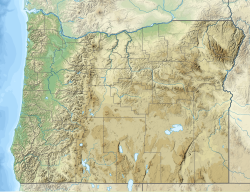Craig Mountain is a 9,204-foot elevation (2,805 m) mountain summit located in Wallowa County, Oregon, US.
| Craig Mountain | |
|---|---|
 Northwest aspect, from Ice Lake | |
| Highest point | |
| Elevation | 9,204 ft (2,805 m)[1] |
| Prominence | 484 ft (148 m)[1] |
| Isolation | 0.55 mi (0.89 km)[2] |
| Coordinates | 45°13′19″N 117°15′46″W / 45.2219192°N 117.2628331°W[3] |
| Geography | |
| Location | Eagle Cap Wilderness |
| Country | United States of America |
| State | Oregon |
| County | Wallowa |
| Parent range | Wallowa Mountains |
| Topo map | USGS Eagle Cap |
Description
editCraig Mountain is located 10 miles south of Joseph, Oregon, in the Wallowa Mountains. It is set within the Eagle Cap Wilderness on land managed by Wallowa–Whitman National Forest.[1] The mountain is situated one-half mile southeast of Ice Lake and two miles east of Matterhorn. The peak ranks as the 33rd-highest summit in Oregon.[2] Precipitation runoff from the mountain drains to the West Fork of the Wallowa River. Topographic relief is significant as the summit rises over 3,200 feet (980 meters) above the river in approximately one mile. This landform's toponym has been officially adopted by the United States Board on Geographic Names.[3]
Climate
editBased on the Köppen climate classification, Craig Mountain is located in a subarctic climate zone characterized by long, usually very cold winters, and mild summers.[4] Winter temperatures can drop below −10 °F with wind chill factors below −20 °F. Most precipitation in the area is caused by orographic lift. Thunderstorms are common in the summer.
Gallery
editSee also
editReferences
edit- ^ a b c "Craig Mountain, Oregon". Peakbagger.com. Retrieved October 6, 2022.
- ^ a b "Craig Mountain - 9,204' OR". listsofjohn.com. Retrieved October 6, 2022.
- ^ a b "Craig Mountain". Geographic Names Information System. United States Geological Survey, United States Department of the Interior. Retrieved October 6, 2022.
- ^ Peel, M. C.; Finlayson, B. L.; McMahon, T. A. (2007). "Updated world map of the Köppen−Geiger climate classification". Hydrol. Earth Syst. Sci. 11: 1633–1644. ISSN 1027-5606.
External links
edit- Weather forecast: Craig Mountain

